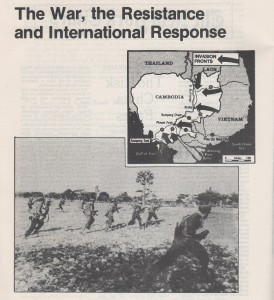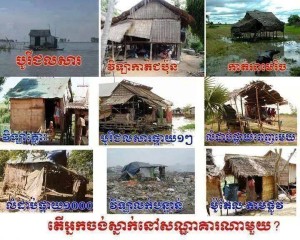This part you shall essentially learn about good leaders must be equipped by Four Sublime State of the Mind ie. Loving-kindness, compassion, sympathy, and equanimity.
This part you shall essentially learn about good leaders must be equipped by Four Sublime State of the Mind ie. Loving-kindness, compassion, sympathy, and equanimity.
Comment: as for the food of thought, article here is taken from History and the Headlines and photos here are taken from Maha Phirum Facebook and many paper works to reflect on this day at the middle.
Cambodia, Vietnamese Occupation of (1978–1992)
 On 25 December 1978, Vietnamese armed forces invaded Cambodia, ushering in an occupation lasting nearly thirteen years. This incursion marked the first and only extended war between communist regimes and led to a brief but bloody border war between Vietnam and the People’s Republic of China (PRC). Moreover, the occupation added to the tremendous suffering that Cambodia endured during the Cold War and greatly affected Southeast Asia.The origins of the Vietnamese-Cambodian conflict are complex and reach far back into history. The Vietnamese and Khmer (Cambodian) Empires had been bitter rivals for centuries. By the early 1800s, much of Cambodia had come under Vietnamese rule or was forced to pay tribute to it. This gave rise to deep-seated animosities that survived decades of French colonial rule, Japanese occupation during World War II, and two Indochinese conflicts spanning nearly thirty years.
On 25 December 1978, Vietnamese armed forces invaded Cambodia, ushering in an occupation lasting nearly thirteen years. This incursion marked the first and only extended war between communist regimes and led to a brief but bloody border war between Vietnam and the People’s Republic of China (PRC). Moreover, the occupation added to the tremendous suffering that Cambodia endured during the Cold War and greatly affected Southeast Asia.The origins of the Vietnamese-Cambodian conflict are complex and reach far back into history. The Vietnamese and Khmer (Cambodian) Empires had been bitter rivals for centuries. By the early 1800s, much of Cambodia had come under Vietnamese rule or was forced to pay tribute to it. This gave rise to deep-seated animosities that survived decades of French colonial rule, Japanese occupation during World War II, and two Indochinese conflicts spanning nearly thirty years.
Some interesting documentaries:
1. Vietnamese invasion in 1979
2. Interviewing Mr. Buy Teen, a former Vietnamese high ranking military staff in Cambodia on “Why Vietnam Withdrew troops from Cambodia?”
Continue reading →
Program: Pragmatic Politics Thought from the Voice of Younger Khmer Generation
This part, you will learn about the Khmer meaning of Leader means a person who plays role model and a person who leads by example. Beside this, you can learn about the hero and heroines of Khmer leaders from the past.
It was broadcasted by CMN on Monday, Dec. 29, 2014.
Beside of this manipulative GDP to increase wealth for the cadres, the elites and the powerful, the inability to collect domestic revenue, has been also factual to increase wealth for those bourgeoisie groups and ingrained corruption officials as well. Hence, the land concession policy, the Economic Zoning Policy, the privatization of state’s assets without fair bidding etc. all are part of injecting more wealth to those bourgeoisie groups.
But to what I called Cambodian people are cold-blooded consumers especially those are dwelling inside the cities and urban areas, are seem passively responding to state’s monopoly of infrastructure supplies such as Electricity, Water, Washes, and Garbage. Tell me how many company in Cambodia are running business to own Electricity or Garbage collection in Phnom Penh (without elaborating entire Cambodia) to value the choice of consumers as well as to structuring the competitiveness in order to gaining productive services and minimized cost? None.
As an example, a house is contracting with only one Electricity company. More the house is using the electricity, more value added cost incurred into their usage. When the house paid late few days, the service provider come to the house and unplug the electricity motor without hesitation. Those agents and services providers sometime are bribed by the house owner to accommodate ease for the need of the light. This is just one of the examples of facade democracy but operating dictatorship marketing system in case just this electricity provision.
Those Cambodian consumers are pointless in this situation. Who could shed some light for them to wake up?
Cambodia political economy can be one of the impressive subjects for university students who have enrolled in Political Science, or MBA etc. From the past to present, Political Economy has transformed into real alternative for political liberalism among post-Marxism scholars. But this article, the author is aiming to elaborate on how Cambodia politics in general has applied political economy into its governance and public administration?
History of Political Economy
I don’t know much about the birth of Political Economy. But according to some texts, the Political Economy has been a classic subject during the heyday of Adam Smith, David Ricardo and many others. Some school of thought such asWilliam Jevons and Afred Marshall keyly focused on productive factors of land, labor and capital to distance itself away from the Politics, or this thought is called “Neoclassical Paradigm”.
During the early 19th century, the conservatives and the Marxists were at their height to debating on the creating of science of society. But at the twentieth century, many subjects were closer to its points ie feminist, ecology, and moral economy etc. This group of post-Edmund Burke and Neo-Marxists likely jumped over the neo-classical orthodoxy towards Political Economy.
And I have noted that modern perspectives are expanding towards all types of periphery ie Politics of Ecology, The Indigenous Politics, The Politics of Diaspora etc.
Cambodia Political Economy
 After the peacekeeping effort and election monitoring by the United Nations in 1993, Cambodia has obtained political package of democratization, strengthening the rule of laws, and liberalize its economic development. While the world has been so indulgent into Economy than Politics and Others, Cambodia has well adapted itself to this new trend.
After the peacekeeping effort and election monitoring by the United Nations in 1993, Cambodia has obtained political package of democratization, strengthening the rule of laws, and liberalize its economic development. While the world has been so indulgent into Economy than Politics and Others, Cambodia has well adapted itself to this new trend.
Continue reading →
